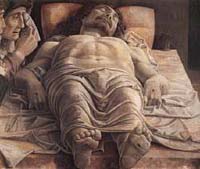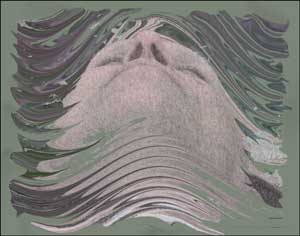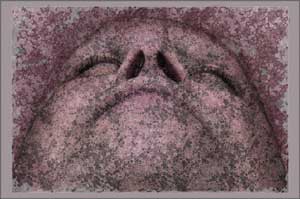Several months ago I ran across a quote that startled me. I was in a copy center at the Junior College and I saw what appeared to be repro of a Chinese fortune cookie saying, “You should be able to undertake and complete anything.” I asked if I could copy the copy and learned from the clerk that another employee had adopted the Chinese fortune cookie saying as a model for how to live her life. As I waited I noticed there were copies of it everywhere at different sizes. I thought the quote absurd. The process of copying it and blowing it up magnified the absurdity.
For me the quote represented a ridiculous perspective on life. The entire idea of being able to control your life and the lives of others around you with such constraint, to subjugate your “reality” to your will was an essential problem of modern life not a solution. But that was my interpretation. The person who loved that quote probably saw it as a way to believe in herself, to take initiative and fulfil her dreams. I decided to keep the quote in a file on my computer along with other annoying quotes I had run across.
 Andrea
Mantegna, The Lamentation over the Dead Christ
Andrea
Mantegna, The Lamentation over the Dead Christ
Recently I completed a self-portrait project for my Painter 6 class. It another self-portrait assignment, actually I was to produce three of them and I squirmed when I realized that I was actually going to do it. I thought about how I could sabotage the assignment and still get credit. I had looked down at the doodle I was drawing. It was a man in the moon, and I was looking up at him as if he were standing above me, his body cloaked in darkness except for his face. His face was full but it poked out of a surface like a coin. I could see the rim a darker black than the surrounding scumbled night with the punched out lips, bulging nose, and monumental chin tentatively protruding out of a tangle of erasures. I had been having a difficult time figuring out the perspective. Hmmm, I could do a series of self-portraits with that perspective. Mantegna had created that powerful portrait of Christ in the 15th century using that perspective. (You can link to see it on the web: The Lamentation over the Dead Christ.) It could work for me. We were using digital cameras to give us a head start on the portraits and I had my partner do several of me from below, actually while I was lying down on my back like the crucified Christ.
After I completed the assignment I remembered the quotes. Maybe they could be used to describe my paintings. My paintings were protests in a way and the quotes were similar because I contested their logic. So what follows is my experiment in an unlikely series of marriages.
The Breakup Reality
Refused
Reality
Refused
The first piece I think of as “The Breakup”. It's somewhat of a headache in disturbing psychedelic colors. My protagonist is making a Promethean effort to put things in order but despite his best intention everything around him breaks apart or dissolves. Now my first quote seems to apply here: “You should be able to undertake and complete anything.” To me it means trying too hard, not letting nature take its course. Another quote that might be appropriate is “Reality is what refuses to go away when I stop believing in it.” This Philip K. Dick quote I don't find absurd. Actually it's an antithesis to my original find; it presents an experiential reaction to an inappropriate belief system. It's funny. I like the piece, the freaky colors, the oddly broken forms and the title reinforced with the quotes seem perfect.
Drowning Man or
Floating Man?
or
Floating Man?
I've never really decided which of these pieces I like the best. If I had to, I'd pick this one: “The Drowning Man”. The man actually doesn't appear to be drowning, he appears to be floating above the waves, almost stoically weathering the storm and any catastrophe he might encounter. It was my intention to let him drown. I'm still looking for quotes for this one. Although I do like Duke Mantee's line in the film, The Petrified Forest, “It looks like I'll spend the rest of my life dead”, I think my victim doesn't really consider himself a victim, or the living dead, perhaps he's more of a Buddhist.
Maybe I don't have to see him laugh or smile to know he's taking life lightly. Why do we have this need to smile all the time for the benefit of those around us, can't we be solemn and happy? Straight faced and buoyant? An antithesis could be “I'm the artist formally known as Beck. I have a genius wig. When I put that wig on, then the true genius emerges. I don't have enough hair to be a genius. I think you have to have hair going everywhere.” We'd only have to switch the hair for the waves. “I'm the floating man. I have a sea of inspiration. When I enter the sea, my true genius emerges. I have no inspiration on dry land. I have to have waves everywhere to have genius.”
Stone
Cold Fame
is Fleeting
Fame
is Fleeting
My last “stone cold” image is almost a perfect fit for a quote from Napoleon Bonaparte: “Fame is fleeting but obscurity lasts a lifetime.” This is another of my favorite absurdities. The quote for me contends that obscurity is the result of having no fame at all. I believe obscurity is when you have been of no benefit to anyone else's life. And how can I offer someone anything of value unless I know them well enough to know what they care about. It's about intimacy, not fame. You're honored for caring. Fame has always seemed so superficial to me. I can imagine myself as statuary - as impervious as granite, seeing the centuries and maybe even the millenniums past as days of sun or rain, helpless to defend against libel or sedition, accept praise or wonder, or worse, fame.
An antithesis would be Elizabeth's Bishop's poem, “Monument”. Here's a brief quote from it. A monument becomes a memory of something cared for, not an abstract person.
The monument's an object, yet whose decorations,
carelessly nailed, looking like nothing at all,
give it away as having life, and wishing;
wanting to be a monument, to cherish something.from The Complete Poems 1927-1979, Farrar, Straus and Giroux, New York Coywrite © 1979, 1983 by Alice Helen Methfessel